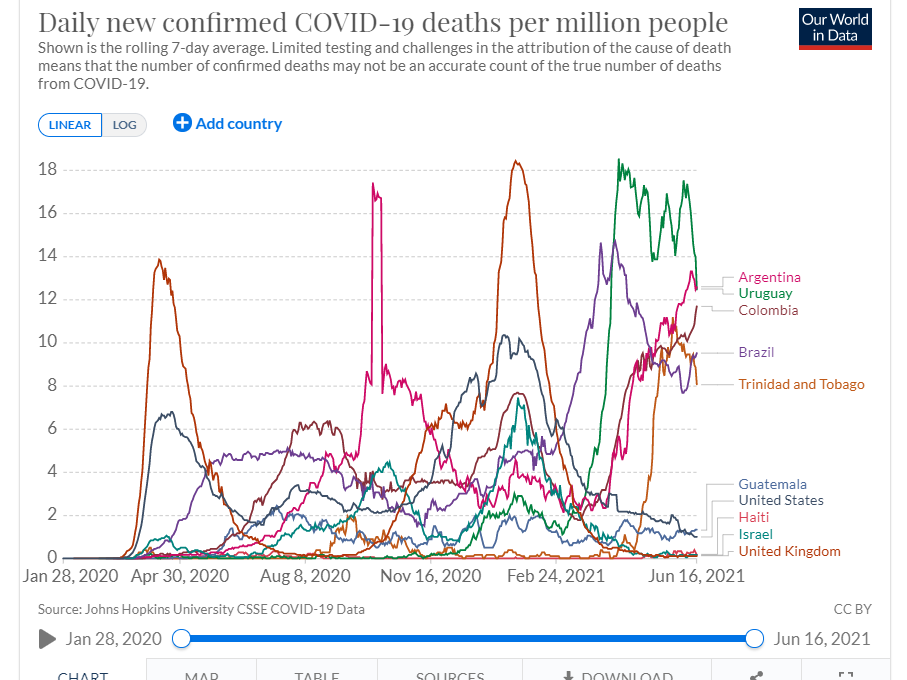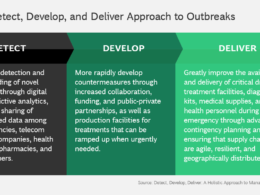Health Policy Watch, Latin America & Caribbean
Madeleine Hoecklin & Raisa Santos
17/06/2021
Citations: Carissa Etienne; Jarbas Barbosa; Sylvain Aldighieri,
Despite the global decline in COVID-19 cases by 12% over the last week, countries in Central and South America continue to be epicenters of pandemic, with high mortality rates and insufficient access to vaccines.
Over 1.1 million new COVID-19 cases and 31,000 deaths were reported in the Americas over the last week, officials from the Pan American Health Organization (PAHO) announced at a press briefing on Wednesday.
“Cases are peaking, hospitals are full, and we are home to four of the five highest death rates in the world,” said Dr Carissa Etienne, PAHO Director.
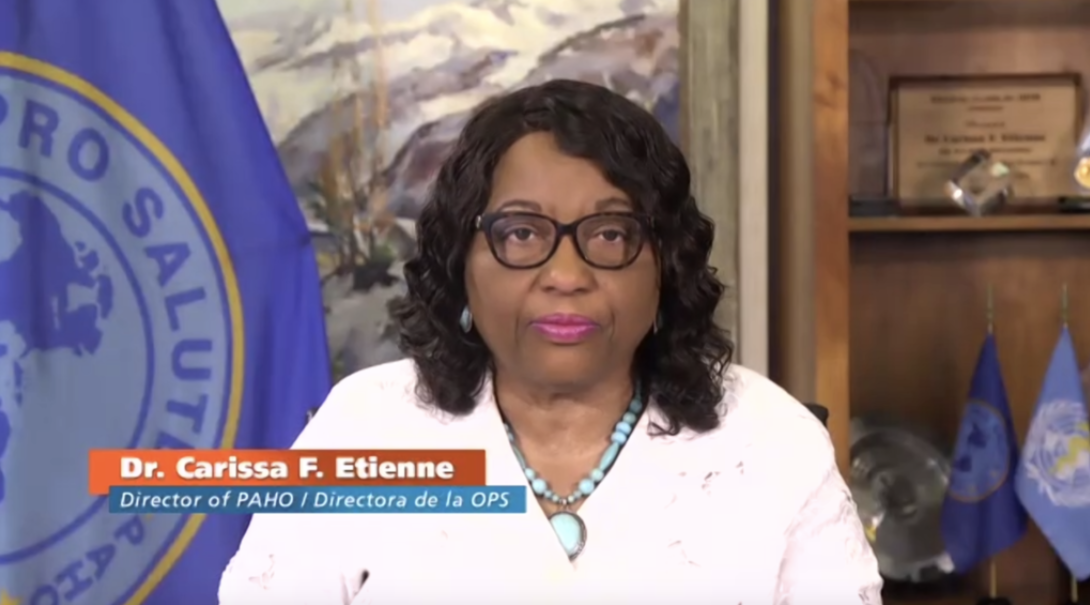
In terms of cases and deaths per-capita, Uruguay, Argentina, Colombia and Brazil, just to cite a few examples, are still experiencing rates 4–5 times higher than new case rates in the United States and even India — despite relatively high rates of vaccination in those same Latin American countries.
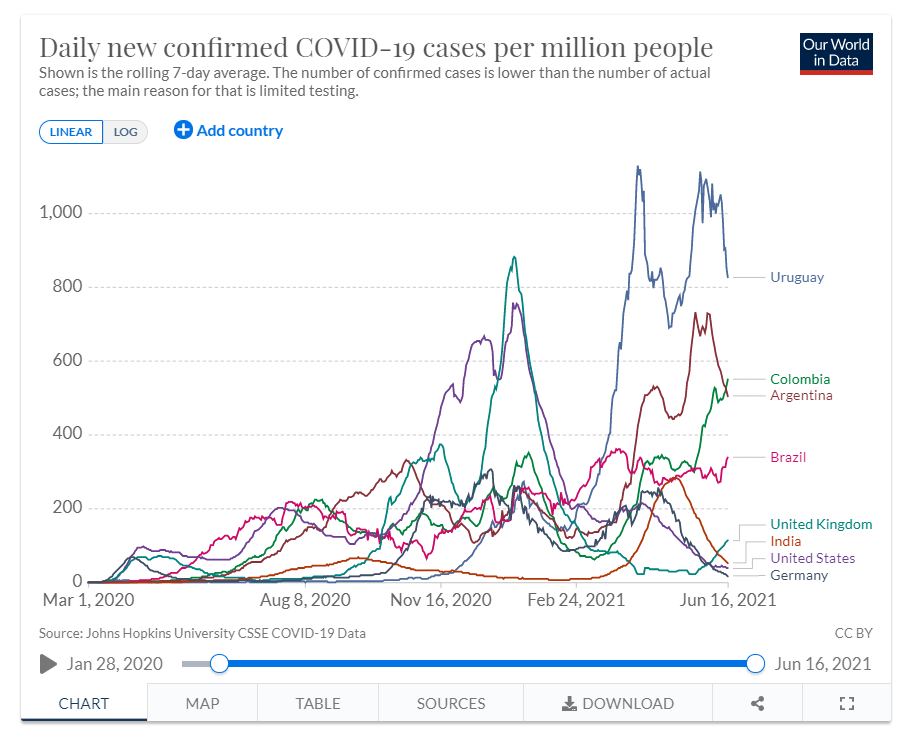
In Bolivia, Chile, Uruguay, and Brazil, recent surges are filling hospitals.
- In São Paulo, 80% of the ICU beds are occupied by COVID patients and
- Colombia is at its worst point yet in the pandemic, reporting a record of 577 new deaths on Tuesday.
Against this backdrop, PAHO officials urged countries with high transmission to tighten public health measures until vaccination campaigns have accelerated further.
“When [public health measures] are strictly implemented and monitored, they are very effective in bending the epidemiological curve and protecting the health care facilities for severe and critical patients,” said Dr Sylvain Aldighieri, PAHO’s COVID-19 Incident Manager.
Vaccination Campaigns Stall in Central and South America
Less than 10% of people in Latin America and the Caribbean, a region of 600 million people, have been fully vaccinated against COVID.
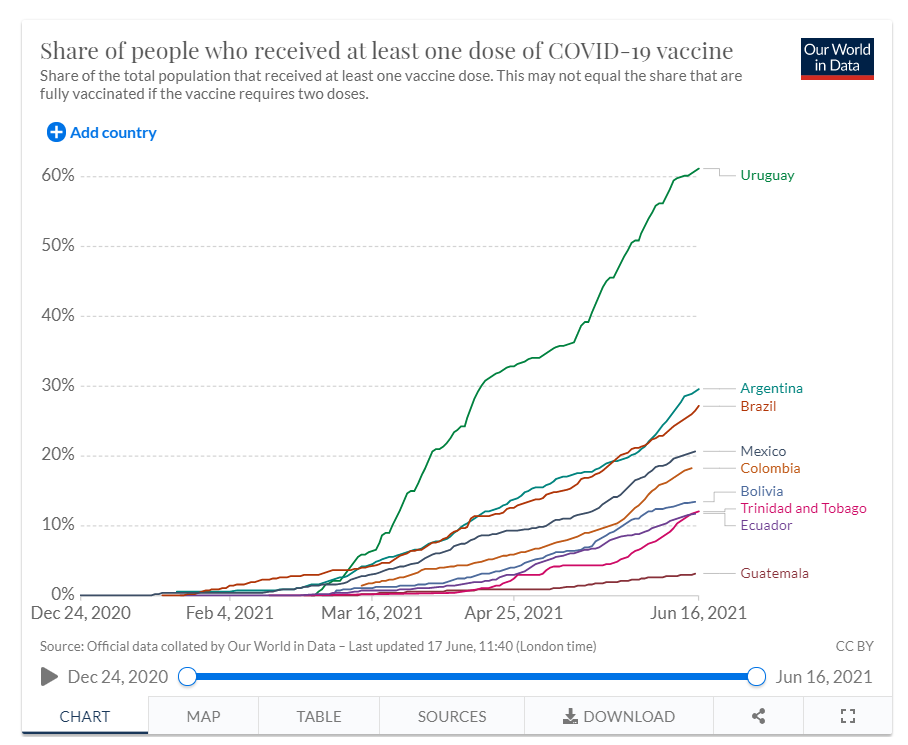
Vaccine rollouts continue to progress slower than what is needed, said PAHO officials. Doses are urgently needed to protect the most vulnerable populations, obtain vaccine coverage, and to control transmission.
“We welcome the announcement by the , who pledged Group of Seven [G7] one billion COVID vaccine doses to countries around the world,” said Etienne.
This commitment offers “fresh hope” to countries struggling to secure enough vaccines to protect their populations.
PAHO officials urged G7 nations to prioritise doses for countries at greatest risk and to not delay the delivery of their donations.
The Americas has been in crisis for months and without the support from the international community, “recovery remains in the distant future,” said Etienne.
In countries where vaccination coverage has been high, including the US, United Kingdom, and Israel, a dramatic reduction in COVID-related hospitalizations and deaths has been seen.
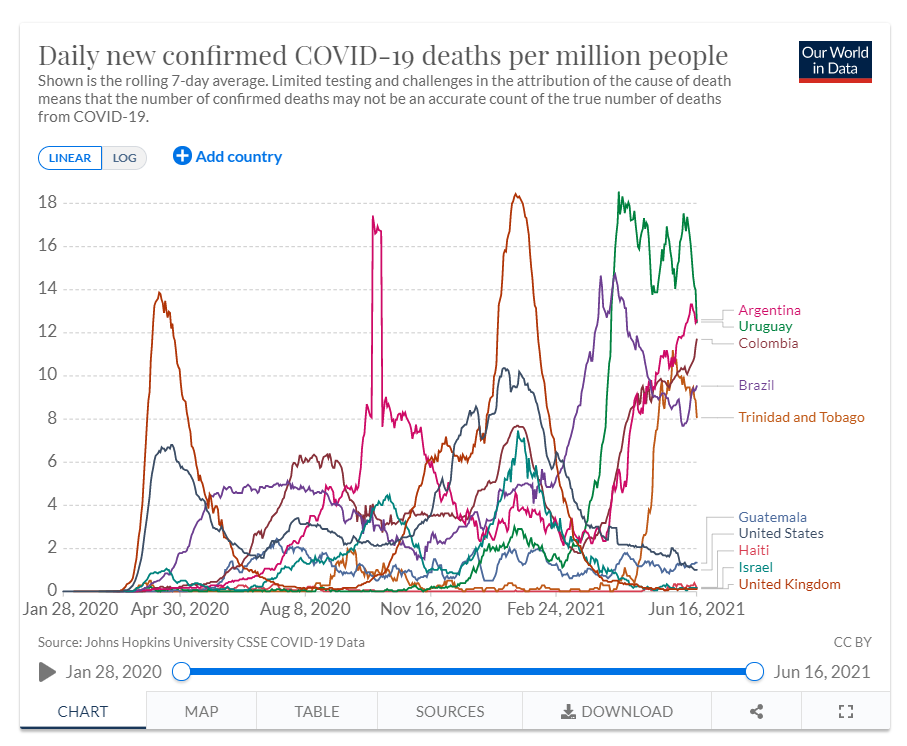
G7 Donation is Insufficient to Fully Vaccinate the Region
“Even with this generous donation, we are still a long way from protecting the more than 600 million people living in Latin America and the Caribbean,” said Etienne.
Reaching everyone in the region will require greater vaccine sharing, financial support to secure supplies, and investment to expand the region’s vaccine manufacturing capacity.
“No country and no region is safe until high vaccination coverage is reached,” said Dr Jarbas Barbosa, Assistant Director of PAHO.
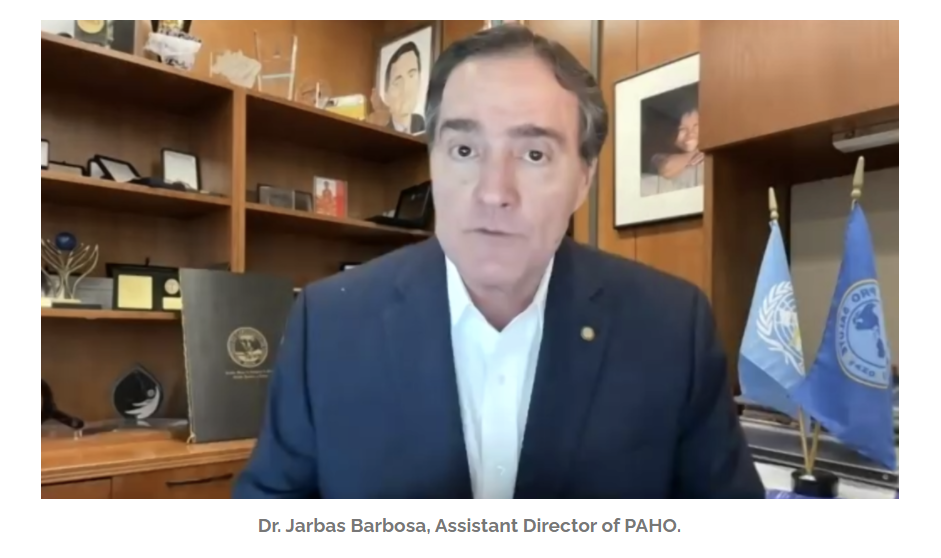
“We are counting on the support of countries, of donors, and the international community to get us there as quickly as possible,” said Etienne.
“No country has reached herd immunity, so more remains to be seen about how we can achieve population-wide protections, particularly as variants circulate,” said Etienne.
This will likely involve
- strengthening the capacity of surveillance systems to detect transmission,
- expanding the capacity of national and local governments to rapidly implement and maintain strict public health measures, and
- strengthening the capacity of health systems to manage the surge in severely ill patients.
Vaccine Hesitancy Needs to be Addressed by Governments Through Communication Campaigns
While PAHO officials stressed that vaccine access is the primary issue across Latin America and the Caribbean and not vaccine acceptance, they also highlighted the need for efforts to increase confidence in vaccination campaigns.
As vaccine campaigns will likely begin ramping up soon in light of the recent vaccine sharing commitments, governments must provide clear and transparent information about COVID vaccines to improve trust.
“It is where there are breakdowns in information and communication, or when details are slow to arrive that misinformation takes root,” said Etienne.
Etienne called for health workers to have the information they need to answer the questions and concerns of their communities and their own families regarding vaccination.
“Health workers should receive special attention, as they’re not just at greater risk of contracting the virus, but they’re also some of the most trusted voices for vaccines,” said Etienne.
“People naturally turn to health workers, including doctors, nurses, and community health workers for medical advice,” she added.
Haiti Hasn’t Received COVAX vaccines
Haiti, in particular, has seen a lack of trust in the health system and distrust of vaccines.
It is the only country in the Americas participating in COVAX that hasn’t received any vaccines. The delay in deliveries was due to governmental instability and a lack of implementation of the administrative measures required to receive the vaccines.
A shipment of 132,000 AstraZeneca vaccine doses from COVAX is scheduled to arrive in Haiti in July and the US plans to deliver doses in the near future.
Haiti has been prioritised to receive vaccines because of the deadly wave that is hitting the country, with sharply escalating cases, hospitalizations and deaths in recent weeks.
“We will probably face a very…challenging situation in Haiti,” said Barbosa. “It’s crucial that they adopt the public health measures, and at the same time, they get the vaccine to protect the most vulnerable groups in the country.”
A good communication strategy is “probably the most crucial part of vaccinations,” said Barbosa. “Unfortunately, the vaccine was the target of many anti-vax groups and people sharing rumours and conspiracy theories.”
“It’s very important that the national authorities in each country establish a direct chain of communication with healthcare workers, with the communities, with the population, showing the data…that vaccines can save your life and contribute to controlling this pandemic,” he added.
Metropolitan Areas Fuel Surges
The uptick of cases in some parts of Latin America can be attributed to socio-economic factors, said Aldighieri.
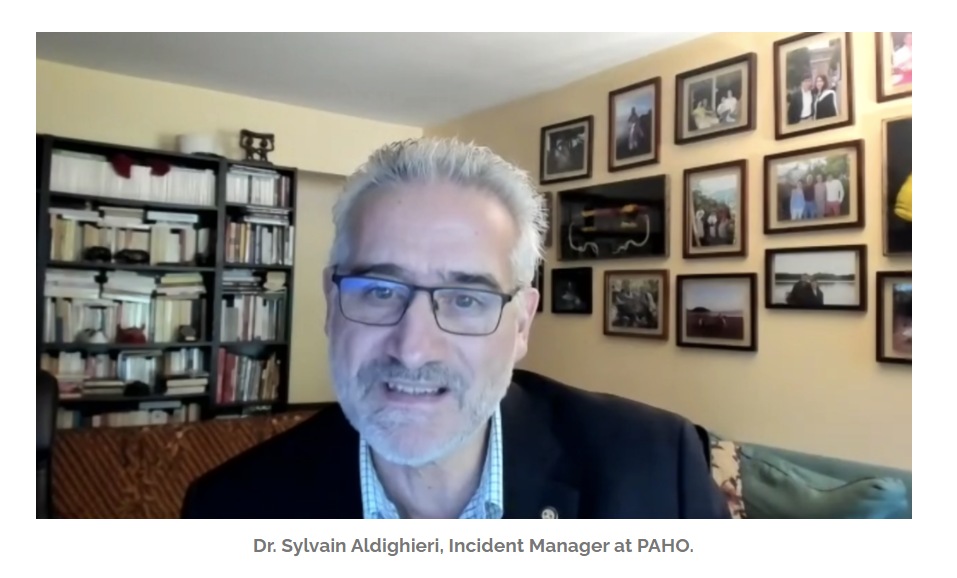
In particular, countries with significant large metropolitan areas means that even during lockdowns, there remains a pattern of intensive, continuing close contact between citizens, which can fuel continued infections.
From the cities, COVID-19 can be quickly amplified and spread again to more remote and rural areas where control of the virus was more successful.
Mexico’s spike in transmission about a month ago has prompted national authorities to monitor the situation in several states, specifically in Baja California and the Yucatan peninsula.
Recent weeks have also seen increases in Costa Rica, Guatemala, and Panama.
“In order to have an impact on the SARS-CoV-2 transmission, countries need to find the right balance between strict implementation of public health measures for lowering transmission, and economic activities,” said Aldighieri.
Image Credits: WHO PAHO, PAHO.
Originally published at https://healthpolicy-watch.news.




